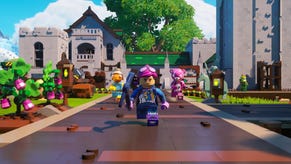Top 10 of 2009: Interviews
We run down what some of the key industry players had to say in the past year
Danny Bilson, THQ (July)
There's no doubt that 2009 was a tough time for publishers, with most making cuts, and some - such as Midway - finally succumbing to the pressure.
THQ was no exception, and went through what's been described as a "reboot" to put it in a better position to tackle the future. Here, executive VP Danny Bilson explains the philosophy of THQ 2.0.
Q: You talk of a 'new THQ' which is encouraging to hear. Was it difficult convincing the old THQ that this is what they needed to do? To adopt these systems and refocus the company on the quality of the product rather than trying to please investors?

Danny Bilson: No, because they were in a failure state. A team that's in the play-offs every year rarely wins a championship because they're risk averse. They're steady. A team that's in the toilet can rebuild and you're allowed to throw out old assumptions and it's easier to actually instigate change in the system.
We're willing to take on risk, so you're seeing giant leaps up in quality as a result of radical change. We didn't have to fight those legacy issues because they clearly weren't working as they wanted them to be. It was a legacy of something. I'll be fair to my own company with Saints Row and some of the wonderful successes they had with the Nickelodeon brands, but the market changed on them. We have to be agile and we have to move fast, so I'm all about driving and moving fast.
Q: So what's the current creative vision for THQ?
Danny Bilson: It's really simple, it's the games. I'm not being glib. How will I build the portfolio? I'll ship three shooters in a year if they're going to be 90-rated and awesome. Good games sell like good movies sell. You don't have to worry about diversifying portfolios and making a pet vet game because everyone else has one. If I had another shooter I could makes us another USD 20 million, so what are we talking about? It's about good.
Q: So THQ doesn't feel like it has to compete in each genre and have a diverse portfolio for multiple systems?
Danny Bilson: How does that even makes sense, I don't understand that? It's funny, but why do I need that? If I had something good for every genre I would do something good for them, but if I have two strong shooters and as long as I'm making the revenue and selling games and people are digging them, I'm good. Maybe I'm completely wrong and mad, but I don't get 'portfolio'. UFC: Undisputed did two million units in two weeks. It's wild in places like Germany and the UK. In Germany the UFC doesn't even play there.
Q: Did THQ's financial situation put a squeeze on your operations or hold back any changes you've wanted to make as part of the new THQ?
Danny Bilson: It's an interesting point and I can make it really clearly. We shut down a lot of studios and laid off a lot of people – 550 – in product development so that others might live. The studios that lived through that didn't get hit at all and they got more money in order to get to quality. The guys who are left didn't feel the pinch at all. We spent millions more on Red Faction: Guerilla at a time when we were closing and contracting all over the place because we have to win in the end.
The key to this whole thing is you've got to have people in your organisation who know what a good game is. I can't overstate that because actually there are a lot of people who don't know. I play a ridiculous amount of games, I've played games since 1977 when my father handed me an Atari 2600 and I was on board games before that. That's all I do, I love and play videogames, so I have a sense of what a good game is.
It's all from personal experience and there are lots of people who also have that. You have to be able to know what's wrong with a game and be able to identify that and figure how to fix it and not ship it. You've got to figure out how to fix it in a cost-effective and timely manner.






.jpeg?width=291&height=164&fit=crop&quality=80&format=jpg&auto=webp)

